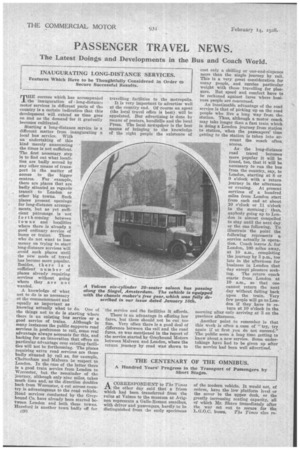PASSENGER TRAVEL NEWS.
Page 58

If you've noticed an error in this article please click here to report it so we can fix it.
The Latest Doings and Developments in the Bus and Coach World.
INAUGURATING LONG-DISTANCE SERVICES.
Features Which Have to be Thoughtfully Considered in Order to Secure Successful Results.
THE success which has accompanied the inauguration of , long-distance motor services in different parts of the country is a certain indication that this development will extend as time goes on and as the demand for it gradually becomes cultivated.
Starting a long-distance service is a different matter from inaugurating a local bus service. With an undertaking of this kind merely announcing the times is not sufficient. The first necessary step is to find out what localities are badly served by any other means of transport in the matter of access to the bigger centres. For example, there are places that are badly situated as regards transit to London or other big towns. Such places present openings for long-distance arrangements, but as yet sufficient patronage is not f orth coming between towns and localities where there is already a good ordinary service of buses or trains. Those who do not want to lose money on trying to start long-distance services will avoid such places until the new mode of travel has become more popular. Besides, there is a sufficient number of places already requiring services without going where they are not wanted.
A knowledge of what not to do is as necessary at the commencement and equally as important as
knowing actually what to do. One of the things not to do is starting where there is an existing bus service or a good service of trains. Although in many instances the public supports road services in preference to rail, some real advantage always accounts for this, and backing for an innovation that offers no particular advantage over existing facilities will not be forthcoming. The places requiring extra road services are those badly situated by rail as, for example, Cheltenham and Malvern in' respect to London. In the case of the latter there is a good train service from London to Worcester, but the remainder of the journey, although only nine miles, takes much time and, as the direction doubles back from Worcester, a cut across country is advantageous to the road vehicle. Road services conducted by the Greyhound Co. have already been started between London and both these towns. Hereford is another town badly off for
travelling facilities to the metropolis.
It is very important to advertise well at the country end. Of course an agent (the local travel office is best) will be appointed. But advertising is done by means of posters, handbills and the local Press. The local newspaper is the best means of bringing to the knowledge ot the right people the existence of the service and the facilities it affords.
There is an advantage in offering low fares, but these should not be cut too fine. Very often there is a good deal of difference between the rail and the road fares, as was mentioned in the report of the service started by Greyhound Motors between Malvern and London, where the return journey by road wad shown to
cost only a shilling or one-and-sixpence more than the single journey by rail. This is a very great consideration for many people, and carries particular weight with those travelling for pleasure. But speed and comfort have to be reckoned against fares where business people are concerned.
An inestimable advantage of the road service is that of picking up on the road people who live a long way from the station. Thus, although a motor coach may take longer than a fast train which is doing a London journey from station to station, when the passengers' time getting to the station is taken into account the coach often scores.
As the long-distance road travel becomes more popular it will be found, too, that it will be necessary to run the bus from the country, say, to London, starting at 8 or 9 o'clock with a return journey in the afternoon or evening. At present services of a hundred miles from London start from each end at about
10 o'clock or 11 o'clock in the morning ; thus, anybody going up to London is almost compelled to stay until the next day or the one following. To illustrate the point the following represents a service actually in operation. Coach leaves A. for London, 100 miles away, at 10 a.m., completing the journey by 3 p.m., too late in the afternoon for business in London that day except pleasure seeking. The return coach starts from London at 10 a.m., so that one cannot return the next day without falling back upon the train. Very few people will go to London if they have to return at 10 o'clock in the morning after only arriving at 3 on the previous afternoon.
Another point to remember is that this work is often a case of "try, try again if at first you do not succeed." The public seem a long time getting to know about a new service. Some undertakings have had to be given up after the service had been well advertised.












































































































